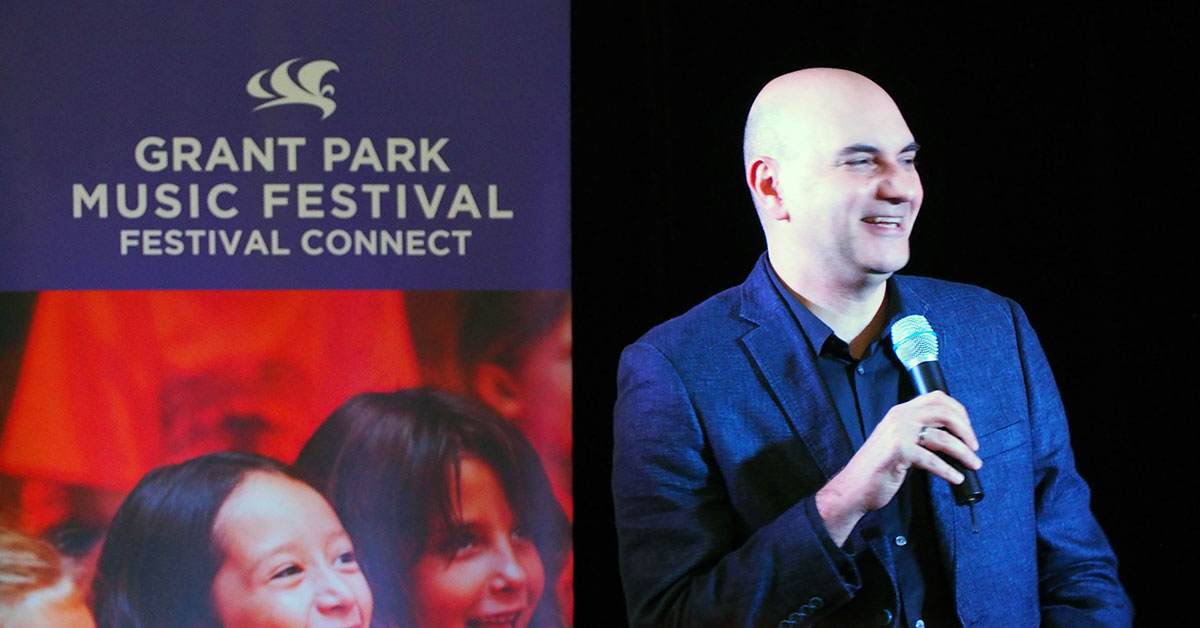I can count on one hand the number of times I’ve written concert reviews and one of those is only because I was paid. In fact, over the past year, I’ve been in a profound state of burnout when it comes live classical music and with one notable exception, I’ve spent the 2018/19 season finding other outlets to fill my cultural tank.
Until last night’s Grant Park Music Festival (GPMF) concert, I didn’t expect to emerge from this sabbatical any time soon. The piece that pulled me out of that funk and rekindled everything that makes me love live classical music was Kareem Roustom’s Turn to the World: A Whitman Cantata.
Written for the GPMF, this world premiere introduced a work that was powerful, profound, and perhaps most importantly, relevant.
The work embodied everything that is meaningful about the discovery of something new and special. As it unfolded, it triggered a stream of thought, creativity, and inspiration. It left me feeling like I was a better person than the one who showed up at the beginning of the concert.
I attended the preconcert lecture which featured Roustom, a composer renowned for his skill and a string of accomplishments, talking about his piece. Personally, I really wish orchestras would stop calling them lectures and fortunately for everyone in attendance, Roustom engaged with the audience. He set the tone by bringing everyone into the broader process and how his observations of concertgoers on previous visits influenced his creative process and how he took the venue’s outdoor environment into consideration.

This wasn’t art for the sake of art nor was it expecting the listener to understand anything. Instead, Roustom went past the basic why’s involved with his selecting Whitman’s text and invited everyone to join his process to arrive at a place of self-reflection.
Granted, I’m practically the poster child for jaded listeners and while I found everything Roustom said encouraging, I still expected to be unmoved.
Fortunately, I couldn’t have been more wrong.
From beginning to end, the 18-minute work grabbed the listener by the collar and delivered a transformative experience. It was helped in large part by never being afraid to use every element of the full orchestra and chorus to its most powerful effect.
The work was practically an aural drug. From the downbeat, it heightened the senses and focused my attention.
It’s a flamboyant, exciting, and challenging work for the performers. It also became clear what Roustom was talking about when he said he took the literal performance environment into consideration when creating the work.
Millennium Park is an enormous space set in the middle of a loud and vibrant metropolitan downtown. At no time during the piece did I feel like my attention had to compete with the surroundings.
It would be unforgivable if I neglected to mention the exemplary job from the musicians in the GPMF orchestra and choir.
The choral part was written to ensure listeners could understand the words. Not once did it feel like I had to pull myself out of the experience to read along in the program book or lament the lack of surtitles. This doesn’t happen by chance; it’s the result of a composer who understands how to write for chorus and to avoid the beartraps of performing in an outdoor setting. Roustom did such a good job at this most critical of tasks, I didn’t even realize it until after the piece was complete.
In the first half of the work, there is a remarkably difficult extended run performed in unison by the entire string section. Granted, it’s difficult enough to write for all five sections in unison without it sounding academic, but the textures Roustom created throughout the winds and percussion helped avoid this trap. It was clear each string player brought his/her A-game. The collective intensity was practically palpable.
I felt on the edge of my seat just waiting to see which section or musician may crash and burn but it never occurred. It’s exactly that type of excitement and risk that contributed to the work’s success. At the conclusion, looks of “did we lose anyone?” across the faces of string players was replaced by a collective exhale and expressions of well-deserved pride.
Having said that, every one of the difficult passages felt purposeful. Never once did they come across as being difficult for the sake of pretentiousness. If you listen to contemporary music, you probably know more than a few composers who fall victim to confusing complexity with cleverness. Happily, Roustom is a composer that respects and empathizes with his listeners.
Under the surface of the strings and chorus work sat some of the finest low brass writing I’ve heard in decades. In particular, the tuba part was remarkable (kudos to GTMF tubist Andrew Smith).
I could go on and on about how much better this work made me feel compared to when the concert started. Frankly, it took all my resolve to sit through the performance of Beethoven 8 on the first half. If I never hear that work again, it’s too soon.
While 2019/20 season programming is complete at most groups, Roustom’s Turn to the World: A Whitman Cantata should absolutely be on your radar for 2020/21.
The work embodies everything music from living composers should deliver: relevance, excitement, and artistry that draws listeners in and leaves them simultaneously fulfilled and wanting more.


